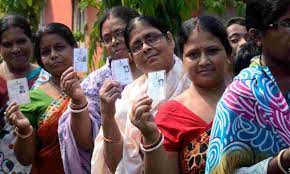Indu Pawar
The safety of women electoral candidates in Jammu and Kashmir has long been a concern in the region. Women who choose to run for political office face numerous challenges, including intimidation, violence, and social stigma. In addition, the threat of violence against women candidates is particularly acute in areas where there is ongoing conflict and political instability. As a result, the number of women candidates in Jammu and Kashmir remains low, and efforts to increase their representation in politics are often hampered by concerns about safety.
One of the primary challenges facing women electoral candidates in Jammu and Kashmir is the threat of violence. This can take many forms, including physical assault, verbal abuse, and harassment. Women candidates who challenge traditional gender roles and stereotypes may be particularly vulnerable to violence, as they are perceived as a threat to the existing power structures. In any case, the male dominated political arena does not accept women politicians very smoothly. First, it is not very easy for women to break the patriarchal shackles to enter politics and even when they are able to do it, they are not encouraged by their male colleagues. They are seen as incompetent and often are faced with male hostility and even abuse.
Social stigma, it may be emphasized, in any case is a challenge that is faced by women electoral candidates in Jammu and Kashmir. With very few women in politics, electoral space is seen to be the exclusive privilege of men, and women who decide to break the norm, are seen to be performing ‘unwomanly’ role. Like elsewhere, women who run for office in J&K are viewed as “unfeminine” or “immodest”. Character assassination is a fear that women candidates face during election and can be seen as a subtle form of violence. If women succumb to this fear , it can make it difficult for women candidates to campaign effectively, as they may not have the support of their families or communities.
Conflict situation of J&K is another problem due to which political role of women has been hampered. During the period of militancy, women found it difficult even to come out for vote in militancy-prone areas. In some cases, women candidates were targeted by militants or other armed groups, who viewed their participation in politics as a challenge to their authority. One can cite the case of Miss Sakina Ittoo, when she faced militant attacks at least four times during 2002 Assembly election. Women representative in panchayats have faced violence for example Ms. Zoona Begum was shot at in Hardshiva village in 2013.
It is because of the above-mentioned reasons that despite efforts to increase the representation of women in politics, the number of women candidates in Jammu and Kashmir remains low. While partially this may be so because politics and public life is still seen to be the domain of men but in part it may also be due to concerns about safety. To address this issue, it is essential to ensure that women candidates have access to adequate security measures, including police protection and safe transport. In the situation in which crimes against women are increasing in the public space, many women find political space to be unsuitable for them. Since contesting elections means being in the public space for longer time, they may not feel confident about contesting election and facing the hazards of public spaces.
There have been efforts to increase the representation of women in politics in Jammu and Kashmir. For example, the Jammu and Kashmir State Election Commission has introduced measures to encourage women’s participation in local elections, such as reserving seats for women candidates and providing them with training and support. Similarly, civil society organizations have been working to raise awareness about the importance of women’s participation in politics and to challenge traditional gender roles and stereotypes.
However, there is still much work to be done to ensure the participation of women in electoral politics. First of all, the public space needs to be made safe for women. Till the time women feel safe and secure in the public spaces, they might not choose to be in politics despite their inclination. The minimum that is required is challenging the culture of impunity that often surrounds violence against women, by holding perpetrators accountable for their actions.
Secondly, it is very important to address the underlying political and social dynamics that contribute to the marginalization of women in public life. Much of such marginalization is due to the social and cultural reasons, and may need some more time to be addressed, yet what needs immediate attention is an acknowledgement of the role that women need to play for the country to be fully democratic. A democratic system requires ensuring that women are represented at all levels of government, from the local to the national level. It also requires creating spaces for women to participate in the development of policies and programs that affect their communities. Thirdly, it is important to ensure safety of female candidates when they decide to contest. Electoral officials and civil society organizations must work to raise awareness about the risks facing women candidates and to provide them with the tools and support they need to campaign effectively. Furthermore, to encourage women participation in legislature and law-making bodies, government may consider to declare some constituencies as women constituencies in rotation so that whole of the UT gets representation from women.
By providing women with the support and resources they need to participate in politics safely, we can help to create a future in which women’s voices are heard and their rights are respected.
(The author is Mahila Congress President, and former MLA)
Trending Now
E-Paper


